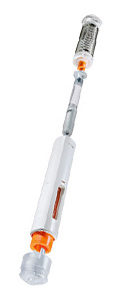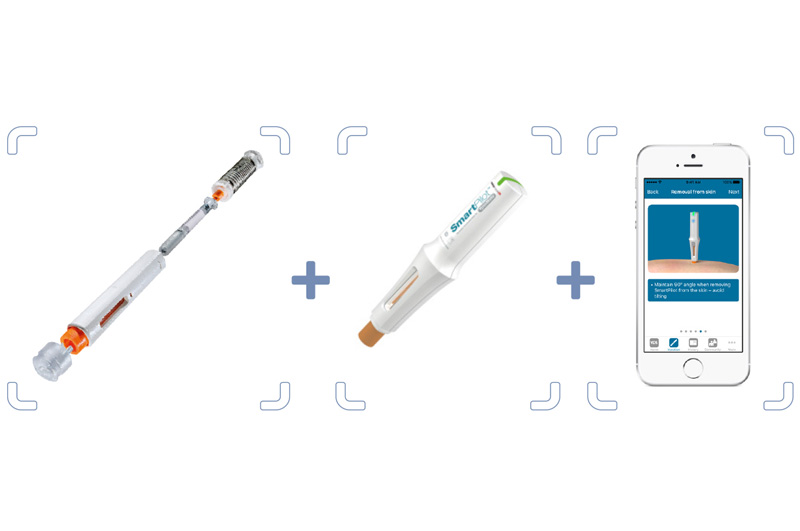S
ince 2005, Orfeo Niedermann, Business Development Director at Ypsomed AG, has been working with partners from the pharmaceutical and biotechnology industry on the development of innovative injection systems for self-medication. In an interview with HARRO, he talks about the trends in this field.
Mr. Niedermann, how did the development of self-injection systems come about?
20 to 30 years ago, therapies that provided for self-medication by syringe were very complex and complicated for patients. Moreover, mistakes can happen when filling a syringe from a vial and determining the correct dose. Depending on the patient’s medical condition, the use of a syringe may no longer be possible due to motor impairment, as occurs, for example, in rheumatoid arthritis. Modern injection systems such as auto- and pen-injectors are much simpler, more comfortable and more reliable to use.
 This is how the YpsoMate® is made
This is how the YpsoMate® is made
The twelve individual parts of the YpsoMate® are pre-assembled into two components at Ypsomed in Switzerland. During final assembly, the front and rear injector units are connected with the syringe, which contains the active ingredient. This step normally takes place at the customer’s location. Beginning this year, Ypsomed offers a final assembly service in Burgdorf. Harro Höfliger offers suitable machine solutions for both assembly stages.
Could you please describe the usage and operation of an auto-injector.
Auto-injectors are injection devices with a built-in inner syringe. By triggering a pre-loaded spring, the contents of the syringe are administered within a few seconds. Our YpsoMate® auto-injector can be operated in two simple steps. The patient removes the protective cap and presses the injector onto the skin. A click signals the beginning of the almost painless injection process via a short, thin needle into the subcutaneous fat layer. The second click indicates the end of the injection. Before, during and after medicating, the auto-injector’s needle is shielded in order to protect the user and third parties from unintentional injuries.
Which medication can be administered?
Typically, auto-injectors are used to administer modern, biotechnologically produced drugs – for example against inflammatory diseases such as rheumatoid arthritis, multiple sclerosis or asthma. The most common self-injecting drug is insulin for diabetes. Here, mostly pen-injectors with an adjustable dose are used. The active ingredient is stored in a cartridge instead of a syringe, and can be used several times until the cartridge is emptied completely.
“To equate needle-free with pain-free is a fallacy.“Orfeo Niedermann, Business Development Director, Ypsomed AG
Can the regions of the world where pen- or auto-injectors are used be derived from this information?
In Asia, the number of diabetic diseases is increasing as a result of changing lifestyles. Thus, the need for pen-injectors is increasing. In Europe and the US, the number of significantly more expensive and less frequently administered biotech drugs is growing, and with that the demand for easy-to-use auto-injectors.
Could the needle be replaced sooner or later?
Needle-free application systems were already developed 20 years ago. When patients are asked if they prefer drug administration with or without a needle, they will decide against the needle. At least until they have tried the needleless injection for the first time. “Needle-free” means that the liquid jet of the drug, that is administered with high-pressure, penetrates the skin and hits more nerve endings than a thin sharp needle. To equate needle-free with pain-free is therefore a fallacy. For this reason, I do not see needle-based injection systems in jeopardy – on the contrary, the demand is growing steadily. Further development trends appear to be directed towards smart injection devices.

The Ypsomed SmartPilot is an example of a smart injection device. This reusable add-on for the YpsoMate® transforms the auto-injector into a device connected to the Internet.
What does smart injection device mean in concrete terms?
Smart injectors are digitally networked. For example, they are capable of detecting whether they are correctly used by the patient. They can record treatment-relevant data, such as administered dose and injection time, and make the information accessible to a physician through a connected smartphone. The Ypsomed SmartPilot is an example of a smart injection device. This reusable add-on for the YpsoMate® transforms the auto-injector into a device connected to the Internet, which offers numerous possibilities for further optimization of the therapy.
Can you describe the development and production of an injector? Which factors play a role?
Prior to development, we clarify various questions regarding patient needs and customer requirements, followed by the design and evaluation of numerous technical concepts. The most promising will ultimately become an actual product. A highly automated production process is taken into account from the outset, in order to ensure the desired functions and low product costs. Staff experience, optimized processes, and a modern infrastructure are other key factors. An auto-injector is made of plastic injection-molded parts and springs, which are assembled at Ypsomed into two components in a fully automatic process. The two components are then delivered to the pharmaceutical company or a contract manufacturer. The active ingredient containing syringe is inserted into the front injector unit and is connected to the rear injector unit containing the spring package.
What do your customers expect from the product they obtain from you?
The injectors must be produced with consistently high quality and must operate absolutely reliably. It is also important for our customers to distinguish themselves from their competitors. Our products allow the pharmaceutical companies to individually design the external shape or color of an injector. The Ypsomed platform technology remains the same, which ensures a short project duration and low costs.
About Ypsomed
![]() Ypsomed AG with headquarters in Burgdorf (Switzerland) is the leading, independent developer and manufacturer of user-friendly injection systems for self-medication. With innovative Swiss-made products such as pens, auto-injectors and large-volume patch injectors, Ypsomed meets all the demands that pharmaceutical enterprises make for self-injection.
Ypsomed AG with headquarters in Burgdorf (Switzerland) is the leading, independent developer and manufacturer of user-friendly injection systems for self-medication. With innovative Swiss-made products such as pens, auto-injectors and large-volume patch injectors, Ypsomed meets all the demands that pharmaceutical enterprises make for self-injection.
Download this article as PDF file
Fotos: Ypsomed AG,Helmar Lünig
